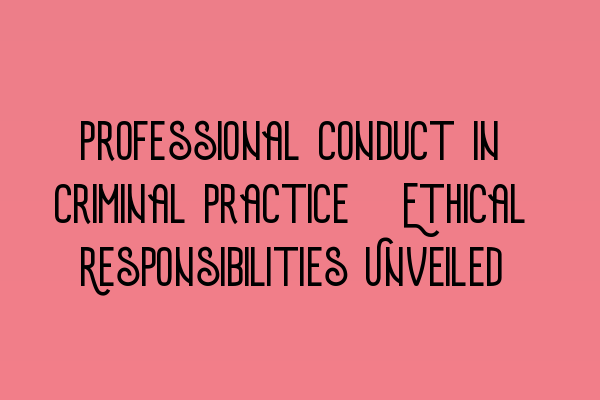Professional Conduct in Criminal Practice: Ethical Responsibilities Unveiled
Welcome to our comprehensive guide on professional conduct in criminal practice. As legal professionals, it is our duty to uphold the highest ethical standards in our work to ensure justice is served. In this post, we will explore the ethical responsibilities that criminal practitioners must adhere to and discuss the importance of maintaining professional conduct at all times.
The Importance of Professional Conduct
Professional conduct is the cornerstone of the legal profession. It establishes the standards and guidelines that govern our behavior as legal practitioners. Upholding professional conduct ensures fairness, integrity, and respect in the criminal justice system.
As criminal lawyers, our clients rely on us to provide them with competent and ethical representation. By maintaining professional conduct, we not only protect our clients’ rights and interests, but also safeguard the reputation of the legal profession as a whole.
Ethical Responsibilities in Criminal Practice
Effective criminal practice requires practitioners to adhere to a set of ethical responsibilities. These responsibilities include:
- Confidentiality: Ensuring the confidentiality of client information is crucial in maintaining trust and upholding the attorney-client privilege. It is our duty to keep all client information confidential, unless disclosure is authorized or required by law.
- Competence: Criminal lawyers must possess the necessary knowledge, skill, and experience to provide competent representation to their clients. Staying up to date with changes in the law and continuously improving our legal expertise is essential to meet this ethical responsibility.
- Candor: Being honest and forthright with clients, the court, and other parties involved in the case is paramount. We must present accurate information and avoid making false statements or misleading representations.
- Conflicts of Interest: Identifying and mitigating conflicts of interest is crucial in maintaining the integrity of the legal profession. We are responsible for avoiding situations where our personal interests may compromise our professional obligations to the client.
By fulfilling these ethical responsibilities, we ensure that our clients receive diligent and ethical representation and that the criminal justice system operates fairly and justly.
Related Articles
For further insights into legal practices and ethical considerations, we recommend the following articles:
- Legal Representation for Delaware LLCs in the UK: Expert Advice
- Ensuring Ethical Business Practices: Delaware’s Code of Conduct
- Legal Challenges for UK Businesses in the U.S.: Strategies for Overcoming Hurdles
- UK Criminal Law: An In-Depth Analysis of the British Legal System
- Legal Challenges for UK Businesses in the U.S.: Strategies for Overcoming Hurdles
These articles provide valuable insights and guidance on a range of legal topics that will enhance your understanding of professional conduct and ethics in the legal profession.
Conclusion
Professional conduct in criminal practice is vital to uphold the principles of justice and ensure the integrity of the legal profession. By adhering to ethical responsibilities, criminal practitioners contribute to a fair and just criminal justice system. Let us always strive to maintain the highest standards of professional conduct in our work.
